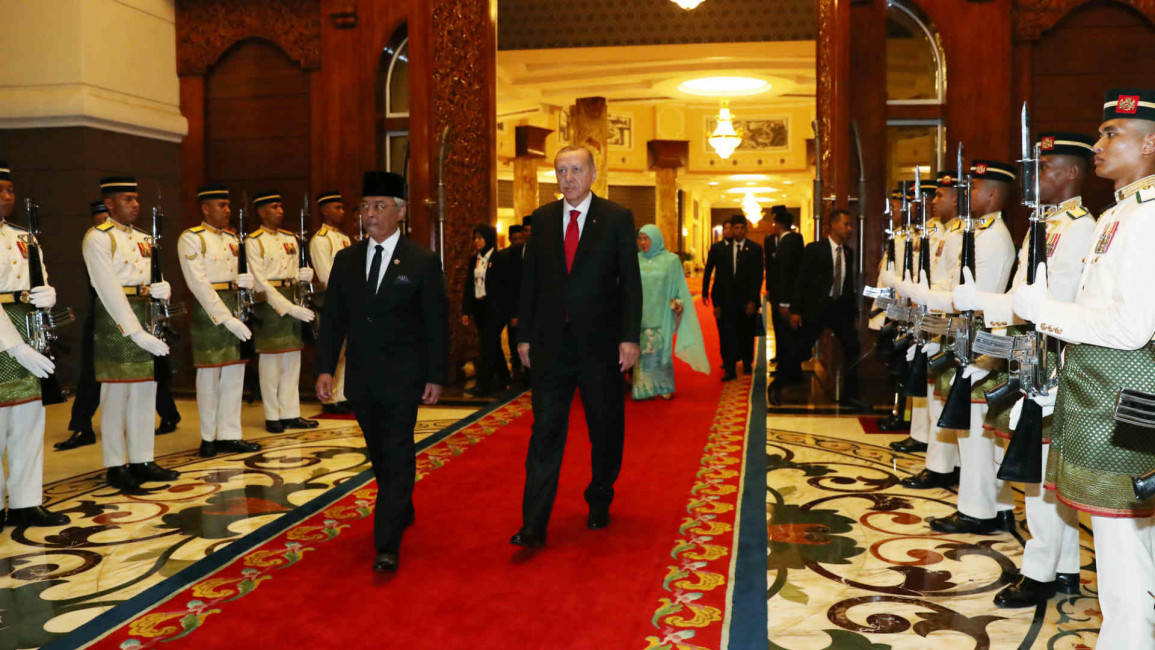Muslim leaders gather in Malaysia for Islamic summit, despite Saudi pressure
Pakistan also gave the Kuala Lumpur Summit a miss, amid rumours that President Imran Khan was pressured into doing so by its Middle Eastern allies Saudi Arabia and the UAE.
Pakistani officials told Reuters that Khan pulled out of the summit amid pressure from his allies but official media reports deny any connection.
Pakistan's Foreign Minister Shah Mahmood Qureshi confirmed neither he nor President Khan would be attending the conference on Tuesday, saying Pakistan pulled out over concerns it could "divide the Muslim world".
Khan backing out is especially strange considering he was a primary backer of the conference, alongside Malaysia's Prime Minister Mahathir Mohamad and Turkey's President Tayyip Erdogan, according to Reuters.
The idea for the Islamic summit was conjured up on the sidelines of the United Nations General Assembly meetings in New York in September, in discussions between Prime Minister Mohamad, President Erdogan and Prime Minister Khan, Arabi21 reported.
Observers see the summit as rivalling the Organisation of Islamic Cooperation (OIC) which is under Saudi Arabia's de-facto leadership.
|
Meanwhile, a right-wing Israeli think-tank fears the Kuala Lumpur Summit could result in pro-Palestinian positions being established.
The Jerusalem Center for Public Affairs pointed to the summit's host Prime Minister Mohamad as a key factor, noting that the Malaysian leader had previously attacked the OIC for not doing enough to support the Palestinian cause.
A Hamas delegation, led by its political bureau chief Ismail Haniyeh, is also participating in the summit.
Iranian President Hassan Rouhani and Qatar's Emir Sheikh Tamim bin Hamid Al-Thani will also attend, Reuters reported.
Formation of a new bloc?
Malaysia's Mohamad and Turkey's Erdogan will dominate the spotlight during the four-day conference, which is likely to discuss the ongoing plight of the Rohingya Muslim minority in Myanmar and rising Islamophobia around the world.
No agenda has been released but the situations in Kashmir, Syria, and Yemen could also feature as conference topics.
Read more: Qatar will not downgrade Turkey ties for the sake of Saudi Arabia, FM says
Saudi King Salman told Prime Minister Matahir on the phone on Tuesday that the discussions should be held through the OIC.
An unnamed Saudi source told Reuters that Saudi Arabia would have only attended if the meeting was held under the banner of the OIC.
"They are very concerned about it," the source allegedly said of the summit.
Bahrain's foreign minister and the Secretary General of the OIC criticised the Summit and said it aims to "weaken and divide Islam and the nation", according to a research associate at the Gulf International Forum.
Prime Minister Mohamad's office issued a statement which clarified there was no intention to create a "new bloc as alluded to by some of its critics", Reuters reported.
'State of affairs'
"In addition, the Summit is not a platform to discuss about religion or religious affairs but specifically to address the state of affairs of the Muslim Ummah [community]," Mohamad's office also said.
In an interview with Reuters last week, Malaysia's prime minister expressed his frustration with the OIC's inaction and said the situation of the Uighur Muslim minority in Xinjiang, China will likely be discussed.
The Uighur community in northwest China has faced an unprecedented crackdown in recent years, with at least 1 million mostly Muslim ethnic minorities held in internment camps that authorities downplay as "vocational education centres".
China has responded harshly to any international criticism of its alleged human rights abuses.
Read more: China censors Arsenal match following Ozil's prayer for Uighur Muslims
The international community has largely been unwilling to risk its economic relations with China on the issue and Muslim countries were among thirty-seven states which cosigned a letter in the United Nations defending China's treatment of Uighur Muslims in July.
Turkey was one of the region's few voices willing to risk its economic relationship with China by expressing support for the Uighur cause.
But recently President Recep Tayyip Erdogan has struck a softer tone, saying a solution could be found to help thousands of Uighur Muslims interned in Chinese camps "taking into account the sensitivities" of both sides.
Follow us on Twitter and Instagram to stay connected



